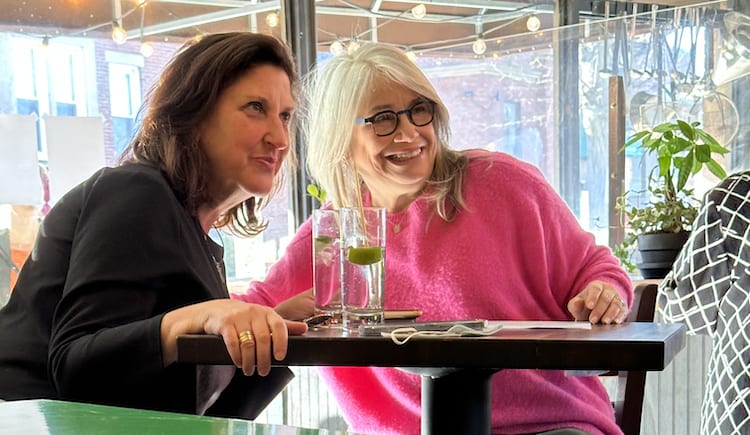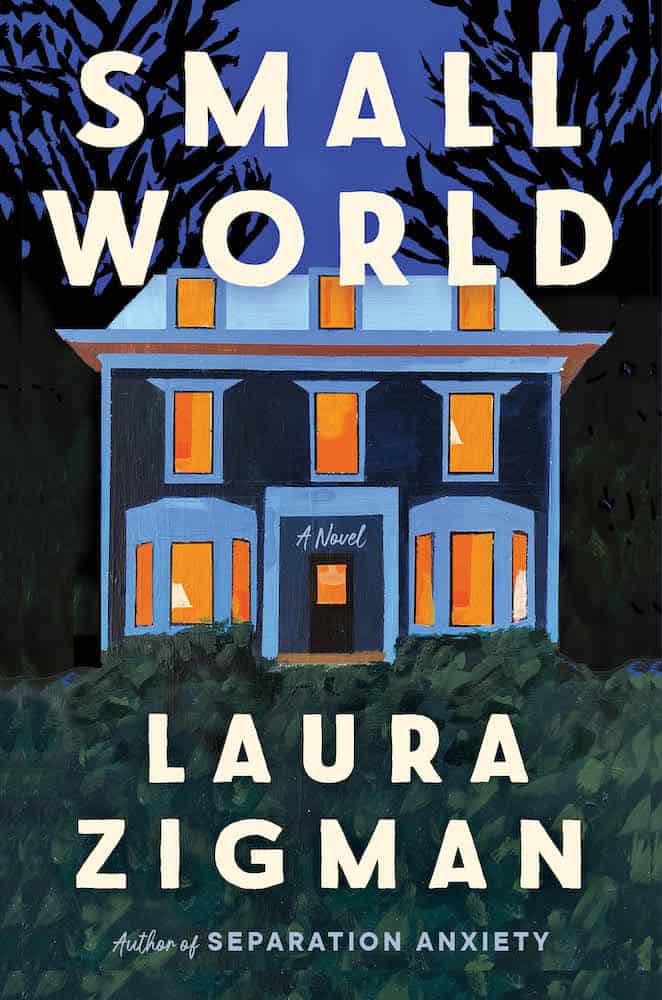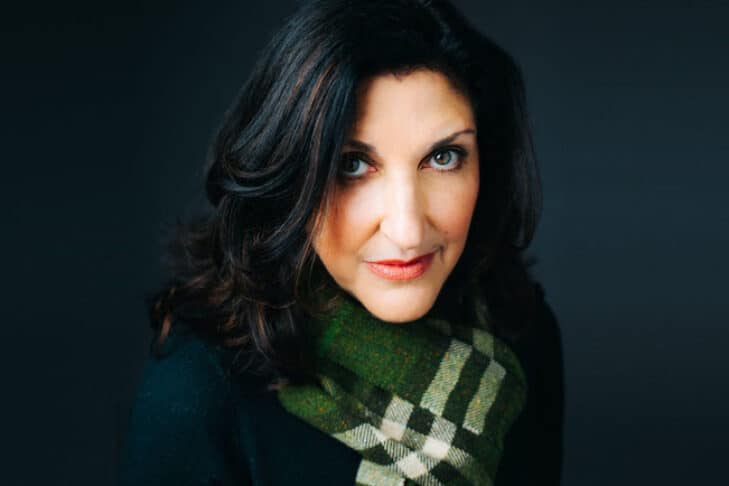On a Saturday afternoon last month, Newtonville Books hosted an event where I had the honor of interviewing the novelist Laura Zigman. The Newton native, who now lives in Cambridge, generously discussed her newly published novel, “Small World,” which is at once comic, tender and sad.
In the book, Zigman portrays the Mellishmans, a family with three daughters, one of whom is disabled. The family holds more than a passing resemblance to the Zigmans. Like Joyce, the novel’s narrator, Zigman was also the youngest of three daughters who grew up with a chronically ill sister. The experience imprinted itself on her soul and on Joyce, Zigman’s alter ego.
Zigman was aware she could mine comedic gold if the two surviving Mellishman sisters—Joyce and her older sister, Lydia—moved into a small apartment together after their divorces. Zigman is a master of portraying family dynamics and what makes sisters push each other’s buttons.
At the beginning of her writing career, Zigman was celebrated as a “chick lit” writer—a description that has mostly fallen out of use. However, if one considers literature celebrating strong women and delving into the complexities of seemingly happily-ever-after endings, Zigman is in the genre’s vanguard.
As the title “Small World” suggests, we all shuttle among our hidden small worlds. It is also the name of Joyce’s neighborhood blog, on which the small details of life, such as selling a bicycle or complaining about a noisy neighbor, are given equal weight. “Small world” as a concept and online neighborhood group fascinates Joyce, who writes poetry based on seemingly mundane posts.
The following are excerpts from our conversation.

Does your fiction often have autobiographical details?
I always begin with a situation happening to me. In the case of “Small World,” I had lived in Newton with my husband and son for a long time before moving to Cambridge, where we had upstairs neighbors who were friends of the people that owned the house. Suddenly, there was a lot of noise, and we didn’t know what it was until they invited us for tea. We found out they were running a business above our heads. I started there. And then I thought about sisters who grew up here. Like the fictional Lydia, my sister went to California after art school, and she’s been there ever since. The idea of what it would be like if my sister moved back, and we lived together, had so much comic potential.
Describe the Mellishmans.
Joyce is the youngest sister, and Lydia is the oldest; Eleanor is the middle child who was born with cerebral palsy and a seizure disorder. The book takes place in Boston, and Louise is the mother. She is nothing like my mother, but she is very much an activist. In the ‘60s and ‘70s, the disability rights movement started out as a grassroots campaign. When I was growing up in Newton, the woman across the street from us was very smart and ran an environmental organization. She lobbied senators and congressional members. She was a force on whom I based Louise, who was committed to Eleanor’s inclusion in the family and in the world.
The Mellishmans were partially based on my family. I had a sister who was born with a very rare bone disease, and she lived at the Fernald School in Waltham from the time she was 2. In the book, Eleanor lived at Fernald for only a year until she died at the age of 10. My sister died when she was 7. The Fernald School eventually closed in late 2014, but those are the roots of “Small World.”

“Small World” is your sixth novel. In the two decades since the publication of your first book, “Animal Husbandry,” a lot happened. Would you share some of your career highs and lows?
I went to New York and worked as a publicist at Random House for 10 years, writing in my spare time. Then I left New York to work at the Smithsonian, a nine-to-five job, and I was able to write in the evenings. I got lucky because it was the time when women’s fiction, called “chick lit,” was taking off as a genre. Many of us came out with books simultaneously, including Helen Fielding’s “Bridget Jones’s Diary.” “Animal Husbandry” was a best-seller that sold in 20 countries and had a movie sale. I thought my career was established. But that’s not how life works.
I’ve had a series of professional and personal ups and downs. But I was fortunate to have a second and third chance after the pandemic. As I said in a recent Boston Globe article, after my fourth book came out and didn’t do well, my agent at the time told me I should stop writing fiction for a while. And so I did, but it wasn’t entirely her fault. I had a lot happening at home. I was diagnosed with breast cancer. My husband and son had issues. Then both my parents died. Every year something happened that prevented me from writing. So, I became a ghostwriter because I had those skills and I needed to earn a living. I did that for 10 years, and in that time, I decided to try fiction one more time.
One of my favorite chapters is when Joyce and Louise are junior counselors at Camp Fantastic, where Eleanor is a camper. It’s a respite for the family. Was there a Camp Fantastic in your life?
I love that chapter too. There was no Camp Fantastic in my childhood, but I watched an excellent documentary called “Crip Camp.” It was the Obamas’ first Netflix project, and it was about a camp in upstate New York that was just for kids with disabilities. They recruited college students whom they trained. This camp was such an empowering experience. As involved as my parents were with Fernald, I never knew there was a camp for kids with disabilities. It was great for Joyce, Lydia and Eleanor to go because they temporarily came together as a family.
“Small World” was recently a New York Times Group Text selection. In her introduction to the monthly column, Elisabeth Egan said: “Sometimes you have a gut sense as a reader that it took a long time for a writer to summon the courage to tackle a subject. As I read the four-page introduction to ‘Small World,” Laura Zigman’s sixth novel, I could practically see her pinch her eyes shut, suck in a breath and say, ‘Let’s do this.’” How do you feel about that description?
I think it’s accurate. I wrote this book after my parents were gone, and my sister and I are now on good terms. Those situations enabled me to write “Small World” without any trouble. A long time ago, I tried writing “Small World” as a memoir. After 75 pages, I realized there wasn’t enough of a real story because we didn’t know my sister who died. We lived through my parents’ grief, which was not a developed story. But nothing is ever wasted. Those pages came in handy when I realized I should write about my family history as fiction.
This interview has been edited and condensed.



